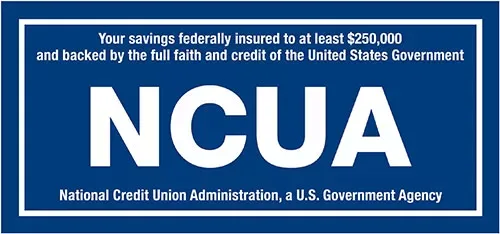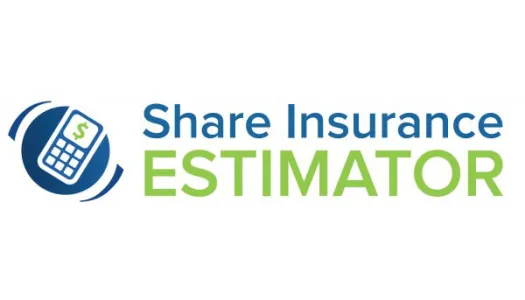What is Share Insurance?
Share insurance coverage offered through the National Credit Union Share Insurance Fund (referred to as either the “NCUSIF” or “Share Insurance Fund”) protects members against losses if a federally insured credit union should fail. Established by Congress in 1970 to insure member share accounts at federally insured credit unions, the NCUSIF coverage is similar to the coverage provided by the Federal Deposit Insurance Corporation (FDIC). Credit union members do not need to apply for share insurance coverage as it is provided automatically when they join a federally insured credit union. Each credit union member has at least $250,000 in total coverage for share accounts held at a federally insured credit union.
Federally Insured Credit Unions vs. Privately Insured Credit Unions
Federally Insured Credit Unions
Federally chartered credit unions are regulated by the National Credit Union Administration and insured by the NCUSIF which is backed by the full faith and credit of the United States government. NCUSIF coverage is similar to deposit insurance coverage provided by the FDIC.
Privately Insured Credit Unions
Some deposits at state-chartered credit unions are insured by private insurers. These private insurers provide non-federal share insurance coverage of deposits that are not backed by the full faith and credit of the United States government.
Federal vs. State-Chartered Credit Unions
Federal Credit Unions
NCUA regulates and insures federal credit unions. A federal credit union can adopt a trade name for use in advertising but its official charter name, which must have the word "federal credit union" in it, must be used in all official or legal communications or documents.
State-Chartered Credit Unions
State-chartered credit unions are regulated by the state supervisory authority where the credit union's main office is located and may or may not be insured by NCUA.
What is Covered Under Share Insurance?
NCUA share insurance covers many types of share deposits received at a federally insured credit union, including deposits in a share draft account, share savings account, or time deposit such as a share certificate. NCUA insurance covers members' accounts at each federally insured credit union, dollar-for-dollar, including principal and any posted dividends through the date of the insured credit union’s closing, up to the insurance limit. This coverage also applies to nonmember deposits when permitted by law. NCUA does not insure money invested in stocks, bonds, mutual funds, life insurance policies, annuities or municipal securities, even if these investment or insurance products are sold at a federally insured credit union. Credit unions often provide these services to their members through third parties, and the investment and insurance products are not insured by the NCUSIF. In addition, NCUA does not insure safe deposit boxes or their contents.
How Do I Know My Money is Protected?
Federally insured credit unions must prominently display the official NCUA insurance sign is shown at each teller station and where insured account deposits are normally received in its principal place of business and in any of its branches. Federally insured credit unions are also required to display this official sign on its Internet page, if any, where they accept deposits or open accounts. A credit union may not end its federal insurance without first notifying its members. If you are unsure whether your credit union is federally insured, use our Find a Credit Union function.

Related Content
-
 Calculate the amount of your insured funds at a federally insured credit union using NCUA’s Share Insurance Estimator. The estimator can be used for personal, business or government accounts. Personal accounts include individual ownership, joint ownership, payable-on-death (accounts with named beneficiaries), living trusts and IRAs.
Calculate the amount of your insured funds at a federally insured credit union using NCUA’s Share Insurance Estimator. The estimator can be used for personal, business or government accounts. Personal accounts include individual ownership, joint ownership, payable-on-death (accounts with named beneficiaries), living trusts and IRAs. -
 Determine if your credit union is federally insured by NCUA by searching for a credit union in Find a Credit Union.
Determine if your credit union is federally insured by NCUA by searching for a credit union in Find a Credit Union.
Revocable and Irrevocable Trust Rule Change Effective December 1, 2026
The share insurance rules discussed on mycreditunion.gov are current through November 30, 2026. The NCUA approved changes, on September 19, 2024, to the share insurance rules for revocable trust accounts (including formal trusts, payable on death (POD), in trust for (ITF), testamentary, or Totten Trust accounts) and irrevocable trust accounts. For most member trust depositors (those with less than $1,250,000), the NCUA expects the coverage levels to be unchanged. However, the new rule may reduce coverage for those members who have placed more than $1,250,000 per member owner in trust deposits at one federally insured credit union. The new rule combines the revocable and irrevocable trust account categories into one insurance category, eliminates some complex rules, and utilizes a simple insurance calculation. You can learn more about the new changes by reviewing this fact sheet. The changes are effective December 1, 2026, giving federally insured credit unions and their members time to adjust to the new rule, including making any changes to avoid a potential reduction in coverage. We suggest federally insured credit unions and their members review the new rules for time deposits such as share certificates with maturities beyond December 1, 2026.
